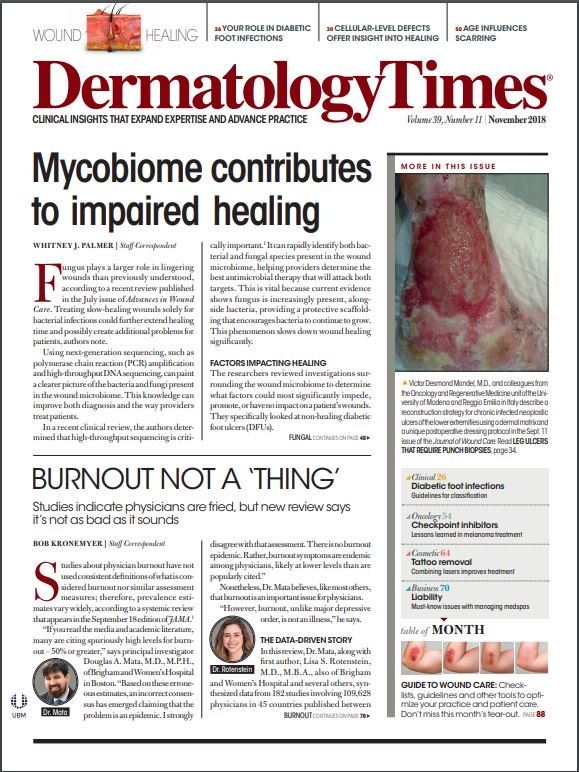- Acne
- Actinic Keratosis
- Aesthetics
- Alopecia
- Atopic Dermatitis
- Buy-and-Bill
- COVID-19
- Case-Based Roundtable
- Chronic Hand Eczema
- Chronic Spontaneous Urticaria
- Drug Watch
- Eczema
- General Dermatology
- Hidradenitis Suppurativa
- Melasma
- NP and PA
- Pediatric Dermatology
- Pigmentary Disorders
- Practice Management
- Precision Medicine and Biologics
- Prurigo Nodularis
- Psoriasis
- Psoriatic Arthritis
- Rare Disease
- Rosacea
- Skin Cancer
- Vitiligo
- Wound Care
Publication
Article
Dermatology Times
EADV report highlights the future of checkpoint inhibitors in advanced melanoma
Author(s):
Checkpoint inhibitors have clearly changed the prognosis of melanoma, yet the search for evidence-based answers to these and other questions regarding their use continues, experts report at EADV this week.
PARISâImmunological response to cancer comprises a series of complex steps â from antigen release to the killing of tumor cells. In cancer immunotherapy, the cytotoxic T-lymphocyte-associated antigen 4 (CTLA-4) and programmed death-1 (PD-1)/ programmed death-ligand 1 (PD-L1) pathways are particularly targeted.
Jean Jacques Grob, M.D., Ph.D., professor of dermatology at Aix-Marseille University, France, identifies two main objectives of immunotherapy: to take advantage of the inflammatory micro-environment in order to activate inhibited T cells (PD-L1 expression), and if this is not done spontaneously, to transform the tumor micro-environment into an inflammatory one.
At the European Academy of Dermatology and Venereology (EADV) Congress taking place this week (Sept. 13, 2018) in Paris, Dr. Grob presented lessons learned in recent years as well as future questions regarding the use of checkpoint inhibitors in advanced melanoma.
SURVIVAL AND RESISTANCE
Dr. Grob reported that recent clinical studies of anti-CTLA-4 therapies show that only a minority of patients with advanced melanoma have long-term survival. The majority developed primary resistance. In contrast, anti-PD-1/PD-L1 agents demonstrated less resistance and greater short-term benefit in terms of survival (e.g. nivolumab vs. chemotherapy and pembrolizumab vs. ipilimumab). Nevertheless, approximately 40% of treated patients develop immediate primary resistance, and progressive secondary resistance also occurs. Overall survival, he says, is no longer a reliable outcome to compare therapies since it is the result of a strategy using multiple drugs, indicating that progression-free survival is more appropriate.
RESPONSE RATE
Checkpoint inhibitors may show a better response later, unlike targeted therapies. An immediate response, though, is not required for long-term survival. Dr. Grob notes that combining anti-PD-1 and anti-CTLA-4 treatments appears to augment the number of controlled patients as well as increase response rates (rapid impact) compared to anti-PD-1 alone.
THE SEARCH FOR ANSWERS
Dr. Grob questioned the future of melanoma treatments and suggested the following responses:
- Why is there primary resistance to immunotherapy? Primary resistance to anti-PD-1 agents (and anti-PD-1 combined with anti-CTLA-4) may be associated with disease aggressiveness.
- Does the survival curve reach a plateau with anti-PD-1 agents? This has not been observed yet.
- Once the disease is under control, when can immunotherapy be discontinued? In patients who are progression-free at 2 years, this has been maintained in most patients after discontinuation. Complete responders have better outcomes.
- What are risks of treating too long? Cost and impacted quality of life.
- What about toxicity? The incidence of adverse events was not found to increase over 2-3 years of treatment with an anti-PD-1.
- Can immunotherapy be given again after stopping? Results appear to support a good rate of re-response.
Checkpoint inhibitors have clearly changed the prognosis of melanoma, yet the search for evidence-based answers to these and other questions regarding their use continues, he said.
REFERENCE
Pr. Jean Jacques Grob, M.D., Ph.D. “Checkpoint inhibitors” (abstract # D1T06.4A), EADV 2018 Meeting, Paris, France, September 13, 3-3:20p.m.

Newsletter
Like what you’re reading? Subscribe to Dermatology Times for weekly updates on therapies, innovations, and real-world practice tips.




























